Las Vegas Lights: Freddy Adu, llamas, and a partnership with a cannabis dispensary
- Published
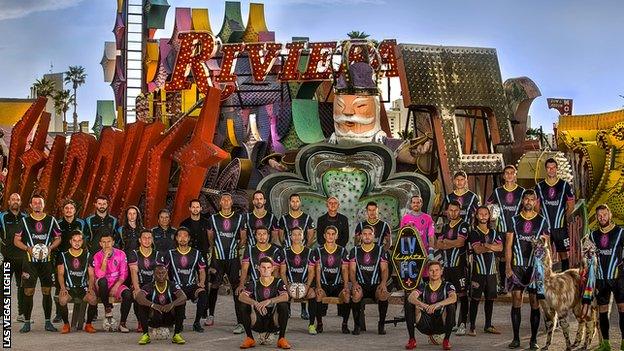
Las Vegas Lights were founded eight months ago and play in the United Soccer League, a division below Major League Soccer
Freddy Adu, a Harley Davidson-riding Elvis lookalike, two llamas, emoji-themed shirts, an in-game DJ, mobile gambling, and a partnership with a nearby cannabis dispensary.
Competing with global stars such as Celine Dion, Elton John and Jennifer Lopez is not easy, but Las Vegas Lights FC founder Brett Lashbrook is certainly taking a novel approach to 'sport as entertainment'.
Lashbrook knows football needs to be taken seriously - just eight months into their existence, his side are unbeaten in the United Soccer League, the division below Major League Soccer.
But he also makes no apologies for wanting to make his club "entertainers".
"There is no shame," the 40-year-old told BBC Sport. "We live in Sin City - the entertainment capital of the world.
"We do take soccer seriously, but it is also Saturday night in downtown Vegas, there are lots of different things for people to choose to do.
"We had a wonderful opportunity to build a club from scratch eight months ago, the essence of which was, 'What can we do to make this fun?'"
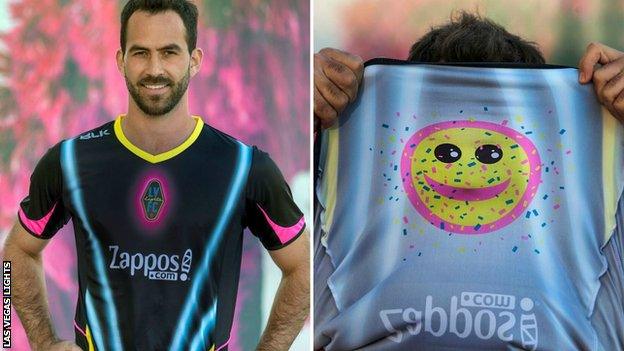
Las Vegas Lights' shirt features a smiley emoji on the reverse
'Marijuana is low down my list of concerns'
Just around the corner from the Lights' Cashman Field is the NuWu Cannabis Marketplace - the largest recreational and medicinal marijuana dispensary in the world.
The drug was legalised in the state of Nevada on 1 July 2017, but can only be smoked at home.
Earlier this month, the Lights signed a deal to promote NuWu at their stadium.
"This is traditional sports sponsorship, a 100% legal industry that is completely regulated and taxed," said Lashbrook. "There was no hesitation from our point of being aligned with NuWu. They are growing like we are, creating economic development and located in downtown Vegas."
The USL has no league-wide policy on the use of recreational marijuana, and told BBC Sport that players are subject to drug testing under terms of their contracts with their clubs.
Lashbrook sees no conflict.
"On the list of concerns of what our players might be getting into, this is pretty low," he says.
"We also have a beer sponsor in the stadium. Does that mean the players can play drunk? These are adults, world-class, full-time athletes. They would not do anything to jeopardise their career."
Players are encouraged to use cannabis-based products such as creams and oils that are permitted by the World Anti-Doping Association.
'Freddy earned his spot'
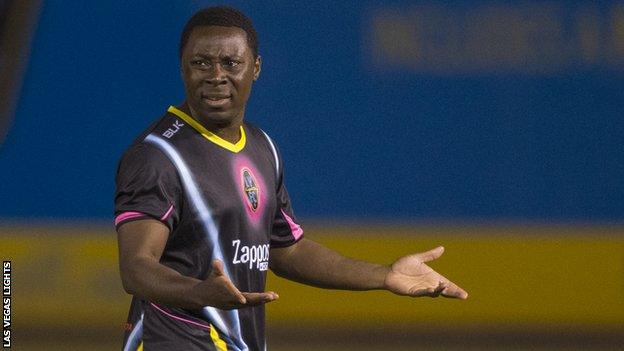
The Lights are Freddy Adu's 14th professional club
"There are difficult things about this project, but trying to find 23 young men who want to be a professional athlete in Vegas is not one of them."
Lashbrook has put together a squad including US, Mexico and Japan internationals. Of those players, Freddy Adu is the most widely known.
Adu was once referred to as "the next Pele" and described himself as "the footballing wonderkid".
Signed by Nike at 13, he played Major League Soccer at 14 and made his debut for the US aged 16. Twelve years later he is playing for his 14th professional club.
A Championship Manager legend, his real-life career has not matched his computer-game exploits.
"This is about the soccer," said Lashbrook. "We are not naive, we know what Freddy's name is and his background, and we know it is instant recognition in a country like the UK.
"But Freddy is focused on his career and we have been pleased with him. We do all this stuff for the fun, but Freddy has not been signed for that. He came on trial and earned his spot."
'We had an on-field faecal incident with a llama'
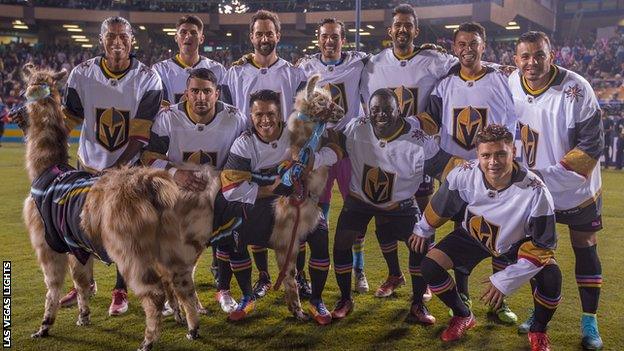
The Las Vegas Lights together with llamas Dolly and Dotty
"We are not trying to bastardise the game, we like to have fun."
Lashbrook's mantra appears to be working. The Lights are pulling in an average crowd of 8,000 on Saturday nights in Las Vegas, despite the other attractions in the city.
Their 10,000-seater stadium is in the city's downtown area, and where "the locals go", according to Lashbrook. It is also near to the famous Freemont Street, with its abundance of neon signs and the world's largest video screen.
Match tickets start from $15 (£10), there is a DJ in the supporters' section, and players are individually announced as they come onto the pitch with extravagant entrances.
Then there are the llamas.
Dolly and Dotty came from shirt sponsors Zappos, an online clothing company which has its headquarters in Vegas.
They became such a hit with fans at tailgate parties they have become part of the pre-game entertainment, though they tend not to stay pitchside for too long.
"We realised during warm-ups that llamas do not have good reflexes," says Lashbrook. "We had an on-field faecal incident with a llama - it pooped on the field two minutes before kick-off."
The official mascot is - in Lashbrook's words - an "Hispanic Elvis Presley with a little Johnny Cash, driving on a Harley Davidson".
Even the football shirts, with their neon flashes and emojis on the reverse, are designed to reflect the 'City of Lights'.
Vegas is one of the only cities in the United States in which betting on sport is permitted, and Lashbrook is aiming to make the Lights the first professional team to have mobile in-game betting.
"We call it a party from 8pm to 10pm," he says. "And after the game, if you want, you have every bar, casino, music and nightlife 24/7 just a quarter of a mile away.
"It is a little bit of Manchester, of Barcelona, of Mexico City, coming to Las Vegas. Nowhere else in US sport can you bring drums, flags and tifos and sing and dance and march for 90 minutes."
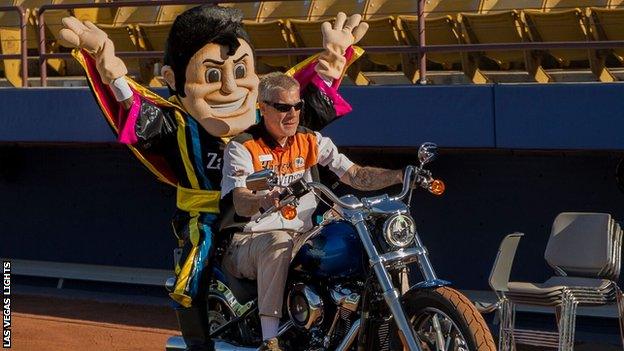
The Lights' mascot - Cash the Soccer Rocker
'Finally proving we are a big-league city'
Lashbrook has spent 20 years in professional soccer in the United States, and helped Orlando City SC become an MLS team and sign Ballon d'Or winner Kaka.
The Kansas City native, whose family made their money in the gas and oil industry, moved to Vegas in 2015 to look after his sick mother and ended up founding the Lights.
"I realised Vegas was the second-largest city in the world without a soccer team," he says. "The growth of the game has moved past the tipping point. It is not finding a city that likes soccer, but a city that has an appropriate venue."
The Lights are the first professional football team in the city since the late 1970s, and part of an emergence of major-league teams in Vegas, an area of 2.2 million people.
Ice hockey team Vegas Golden Knights have reached the play-offs in their debut NHL season, while NFL side Oakland Raiders are relocating there.
"We have always been a big-league city and now we finally proving it," he says. "There is a raising tide, raise all ships mentality."
While the Lights have become an attraction for tourists, with visitors from 32 of the 50 states of America, that is not their target audience.
"We always say we are for Las Vegas, by Las Vegas of Las Vegas. This team is for the locals."
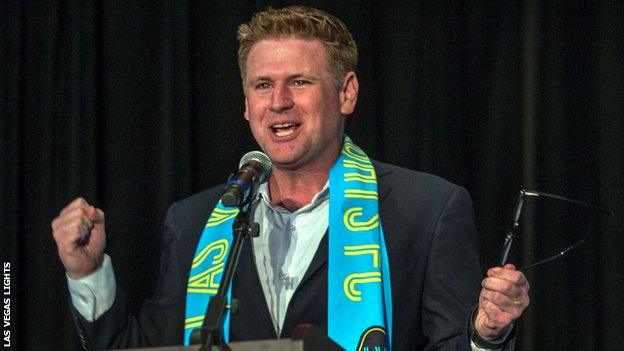
Las Vegas Lights owner and founder Brett Lashbrook